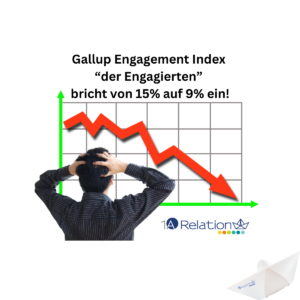The planning phase for the coming year starts in the fall of each year. As always, it should be a little more. We all know the mother of all butcher’s questions: can it be a bit more? Of course, the shareholders or donors want that. The task was, is and remains: To powerfully shape the future of the company.
Note: You don’t have to approve of or support everything the Ultras do. This is therefore an objective, non-judgmental look at the specifics.
The load is getting heavier
However, there is now a sense of uncertainty among many leaders about how to improve. The many global crises such as climate change, energy issues, Russia at war in Ukraine, massacres and hostage-taking in Israel. And then there’s ChatGPT.
All of this puts us under a lot of pressure, summarizes Joachim Pawlik in his opening keynote of his own congress. It feels, he summarizes, like a heavy burden that we are carrying. But the formula “put in more energy to achieve more results” no longer works.
How can we as a company or the whole team recharge our batteries?
So the big question is: how can we gain or regain the energy to recharge our batteries and shape the future? Because it’s not a good feeling when we “feel” that we lack energy.
Powerfully shaping the company’s future or Shared suffering is half the trouble.
After many discussions and research, it has become clear that individuals can no longer manage this alone. A different distribution of tasks is needed. His first interim conclusion is: a problem shared is a problem halved.
Which group could be a role model?
But what should a group look like that recharges its batteries rather than losing them? According to Pawlik, who could be a role model or example to symbolize this theme of “recharging your batteries”?
According to J. Pawlik about his team, we were looking for a group that is not paid and that you can join and leave. It should be of a representative size, comparable to a company.
After a few hours, we came up with an obvious group. The ultra-fans of FC Sankt Pauli. Close, because Joachim Pawlik himself was active there for many years as vice president.
It was therefore interesting to find out why fans invest around 10 to 20 hours a week for their club for nothing in return. They even pay for the ticket and admission. That’s around 1,000 to 2,000 people – quite comparable to a medium-sized company.
What are the core elements of the St. Pauli Ultras? e.g.
- Support of the association and
- Solidarity and community
In the course of his presentation, Pawlik shows which moments or empathy are created to recharge one’s batteries.
Slogans or statements such as: “If you touch one, you touch them all” help here. If one person is not allowed to go, then everyone else won’t go either.
The slogan “Faith, love, hope” symbolizes another aspect: the fans also take care of personal problems such as money worries or noisy neighbors. Or, the first song in the stadium is dedicated to those fans who are not allowed into the stadium (e.g. because they are banned or don’t have a ticket).
Is there a hierarchy in the Ultras?
There is no boss. This group has no fixed leadership structure. Anyone who takes responsibility is allowed to lead. Everyone participates. Every idea is discussed, because rejecting an abstruse idea carries a great risk of a shitstorm, Pawlik recalls from his own experience.
Another example: the lounges in the stadium. A lounge in the stadium was not allowed to be rented out because the Ultras were working all week on a new banner for the next game. All banners = flags are home-made, nothing is bought. Even the food is taken from home.
If you can’t feel it, you can’t understand it!
Lecture J. Pawlik, at the 22nd Pawlik Congress, 14.11.2023
Powerfully shaping the future of the company
The slogan “If you can’t feel it, you can’t understand it” reflects the shared celebration and suffering. Successes are celebrated together, defeats are borne together. After an away match in Sandhausen, around 200 fans arrived at 2 a.m. to greet the fan bus with the players. Set the alarm clock, get up, recharge your batteries.
Powerfully shaping the company’s future – what does this mean for a company?
- rethink hierarchy and responsibility.
- reduce internal power struggles.
- optimization should not be at the expense of self-efficacy.
- take into account that life does not stop at the door.
- build a sense of community in order to develop strength.
- reorganize the way we deal with winning and losing.
Conclusion on Powerfully shaping the company’s future:
In conclusion, there are ways out of powerlessness that we need to tackle. The lecture makes it clear that there are several ways to counteract this powerlessness.
Author’s addendum: It is so important to shed ballast.
Less ballast means a reduction in load or less loss of strength. These can be very different aspects, such as
Clearing out customers (–> a customer value analysis helps here)
Distributing management tasks (–> Think sociocracy and holocracy)
Where are time wasters that eat up energy? Getting rid of cherished but unnecessary tasks (–> employees suggest what they consider unnecessary -> get rid of ballast)
Have fun watching. As always, Joachim Pawlik’s presentations are both entertaining and inspiring. Now it depends on what you make of it and what you do with it.












